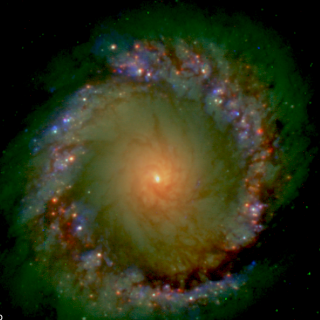Bibcode
Mezcua, M.; Farrell, S. A.; Gladstone, J. C.; Lobanov, A. P.
Bibliographical reference
Monthly Notices of the Royal Astronomical Society, Volume 436, Issue 2, p.1546-1554
Advertised on:
12
2013
Citations
36
Refereed citations
29
Description
The origin of the high X-ray luminosities of most ultraluminous X-ray
sources (ULXs) still remains poorly understood. Most of the scenarios
proposed to explain their nature assume that ULXs are powered by
accretion on to a black hole (BH). In this case, the detection of
compact radio emission and the location of the ULXs in the Fundamental
Plane (X-ray versus radio-luminosity plane) can provide an estimate of
the ULX BH mass and help address the question of their physical nature.
We present the results of a high-resolution (very long baseline
interferometry) radio observational campaign aimed at detecting and
studying compact radio emission in four ULXs with known radio
counterparts. We find that one of the targets (N4559-X4) was previously
misclassified: its low X-ray luminosity indicates that the source is not
a ULX. No milliarcsec-scale radio emission is detected for N4559-X4 nor
for the ULXs N4490-X1 and N5194-X2, for which upper limits on the radio
luminosities are estimated. These limits argue strongly against the
presence of supermassive BHs in these three systems. For N4559-X4, the
low X-ray luminosity and the ratio of the radio and X-ray luminosities
suggest the presence of an X-ray binary. Compact radio emission is
detected for the ULX N5457-X9 within its Chandra positional error,
making N5457-X9 a potential intermediate-mass BH with steady jet
emission.
Related projects

The Central PARSEC of Galaxies using High Spatial Resolution Techniques
PARSEC is a multi-wavelength investigation of the central PARSEC of the nearest galaxies. We work on black-hole accretion and its most energetic manifestations: jets and hot spots, and on its circumnuclear environment conditions for star formation. We resort to the highest available angular resolution observations from gamma-rays to the centimetre
Almudena
Prieto Escudero